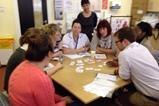Alex Fox, Glen Garrod and Rob Webster on how voluntary, community and social enterprise organisations are at the heart of developing more integrated systems
There has never been more awareness of how vital voluntary, community and social enterprise organisations are to an effective and sustainable health and social care system. And yet a recent survey found that less than half of charities expect to survive more than five years, with many reporting falls in funding from cash-strapped local government and NHS partners.
Even if they weather the immediate financial crisis, the big long term challenge facing our public services is how they can help people to live well for increasing lifespans, avoiding or delaying the onset of long term conditions wherever possible, and effectively self-managing those conditions they do develop. That will require a different kind of relationship with people and families, with support that reaches them earlier and in their own homes and communities wherever possible.
Even well-funded statutory organisations cannot do that alone: they need community-rooted VCSE partners to build trust and reach communities and groups who face additional inequalities and are at the wrong end of the inverse care law.
King’s Fund research, commissioned in response to the Joint VCSE Review, found that some health and social care commissioners regarded VCSE organisations mainly as provider organisations like any other. For them, the challenge was finding provider organisations to deliver plans they had already devised.
Local partnerships
But there are also commissioners who recognise that VCSE organisations are also potential design partners, helping them to co-design systems and services, which fit better with people’s changing and very individual lives. These commissioners invest time in building effective local partnerships and increasing their reach into the communities they serve.
Rather than VCSE organisations asking hard-pressed statutory organisations to find spare cash, statutory and voluntary organisations can see citizens as owning the resources in the system, with both sectors sharing responsibility for reaching and engaging those citizens in decision making
Some NHS providers take the same approach: South West Yorkshire Partnership Foundation Trust partners with Creative Minds and Spirit in Mind to provide a framework for hundreds of local charities, with great prevention and wellbeing results.
It was this shift towards sharing responsibility with VCSE organisations that the Joint VCSE Review identified as the solution to the funding conundrum facing local systems, which need civil society more than ever, but have ever scarcer resources.
Rather than VCSE organisations asking hard-pressed statutory organisations to find spare cash, statutory and voluntary organisations can see citizens as owning the resources in the system, with both sectors sharing responsibility for reaching and engaging those citizens in decision making. The VCSE sector also needs to adapt to this new way of working, collaborating, innovating and being prepared to demonstrate its reach and impact.
The new action plan from the Joint VCSE Review sets out three sets of actions, which aim to make this a reality.
First, basing integrated health and care systems around achieving and maintaining wellbeing, recognising that individual and community wellbeing and resilience need to be clearly defined, measured and demonstrated if they are going to be invested in during tough times.
Second, embedding co-design, including through resourcing user led and grassroots groups and challenging those groups to “do what they say on the tin”: reaching people who might otherwise not have their voices heard.
Finally, bridging the worlds of statutory budget managers and VCSE organisations, using levers like the Social Value Act powers, which enable commissioners to put a value on the social capital that great VCSE organisations generate, and using models like Social Prescribing, which help GPs to use and support community groups.
Taking these approaches can unlock more of the resources of communities and the resourcefulness of people and families. They should be at the heart of developing more integrated systems: what better way to redesign care for the future, than in partnership with the people who need the most but get the least?
Alex Fox OBE is the chief executive of Shared Lives Plus and independent chair of the Joint VCSE Review. Glen Garrod is the president of ADASS. Rob Webster is the chief executive of South West Yorkshire Partnership FT.
The Joint VCSE Review action plan is launched on 16th May with a webinar featuring Alex Fox, Glen Garrod and Neil Churchill of NHS England: register to take part via England.voluntarypartnerships@nhs.net or see and comment on the recommendations at https://vcsereview.org.uk.




































2 Readers' comments